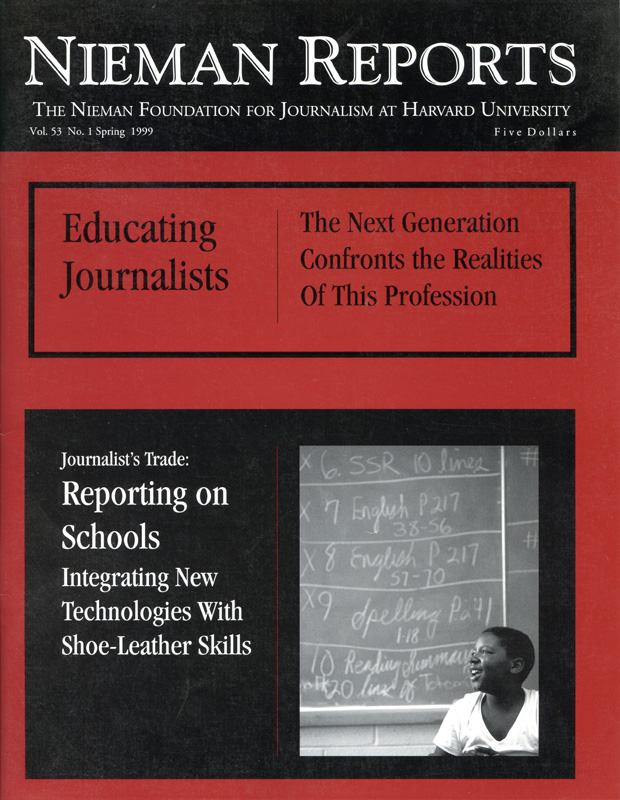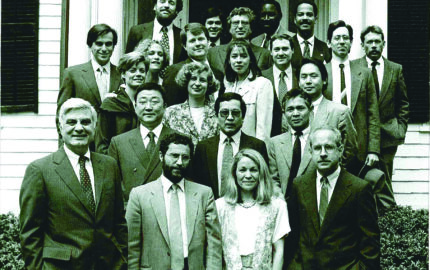The Virginia Press Association invited me to their annual meeting to talk about the future. Specifically, they wanted to talk about how newspapers compete in the world of cyberspace. The weather canceled those plans so I’d like to pass along the gist of what I’d intended to say.
The proliferation of voices created by the new technology combined with the 19th Century notion of what makes news has—in cases from O.J. Simpson’s trial to the impeachment story—created endless, overlapping reports of the same event rendered almost meaningless in the telling.
How does journalism regain its balance in this world? I think, as they say in the movies, it’s back to the future.
No editor or publisher I know doubts newspapers will survive in the future although the form of delivery will change. The future then places in the hands of journalists emerging tools to develop different ways to tell the important stories that will assure an audience.
Let me offer a few suggestions.
First, there needs to be a renewed understanding of quality journalism. What will succeed in cyberspace is reliability. As the world of information becomes one of limitless voices marinated by advertising and entertainment to produce what I call advertainment news, the simple virtue of reliable information will become more distinctive. This simple virtue has equally simple requirements for its realization: boundless curiosity, the indispensable attribute for deep and textured detail that results from tenacious research and reporting. Curiosity and the wide-ranging knowledge and expertise that provide broad context in the stories produced.
Some of these skills—knowledge and expertise—can be taught, which means journalism education must rise and rise quickly to meet these new levels of challenge.
But the basic skill—curiosity—is an innate skill. It must become a habit of the mind, nurtured in newsroom environments open to fresh ideas, encouraging of creative ways of looking at old subjects and resistant to the herd instinct.
The second area that needs to be examined is what we cover and how we cover it.
International news is perhaps the most obvious example. In a wired world in which anyone with a computer can read dozens of international newspapers at will we are inviting those who care to go elsewhere for their news.
For U.S. newspapers to all but ignore a world that has become more interdependent, one in which both the threat and the promise of our future are tied directly to worldwide trends and distant events, is shortsighted and ultimately costly.
We must find ways to develop a curiosity about how distant activities and events might affect the people around us. One way to do this is by letting readers know how they are impacted by decisions made on agricultural crops in Mexico or bank loans in London or technological advances in Japan or the number of African students at the local college.
In the early days of radio, William Paley told skeptical subordinates who said there was no audience for classical music, “You give me the program and I’ll give you the audience.” They did, and the New York Philharmonic broadcast became one of radio’s longest-running programs.
There is reason to believe that, once the public’s taste is cultivated in this regard, it will reap the harvest of an equally avid audience.
Finally, as the devolution of revenues and authority make what is happening on the state, regional and local level more important to our readers, we must think of better approaches to the way we monitor institutions close to home.
The proliferating world of nonprofit organizations is exploding as the newly rich invest in private philanthropy. This combined with the privatization of public functions is reshaping public life in ways few of us fully comprehend.
Because neither nonprofits nor privatized agencies are as transparent as public institutions, only an alert and curious press can make understandable these relationships that directly impact on the health and welfare of communities. What does it mean, for example, that by privatizing prisons we create a for-profit institution that has a vested interest in incarceration? What is the impact on a community when individuals withhold taxes from the support of broad public programs in order to support personal philanthropy?
There are limitless possibilities to redefine news in ways that will set the work of journalists apart from the babble of self-interest and self-celebration and, in the process, make the work of journalists more compelling, more connected with, and more rewarding to the public.
A secure place for quality journalism in the mixed media culture of today is assured if we produce reliable information that results from a disciplined methodology and write stories filled with depth, detail and context.
In doing this, we can reexamine the changing relationships between people and institutions in the world and in our society, exploring anew the currents, trends and events that are shaping their personal and professional lives.
Curious reporters on the lookout for the human implications of these interrelated pressures are going to find new sources of news and bring to the pages of newspapers the vigorous voices that your community is waiting to hear.
The proliferation of voices created by the new technology combined with the 19th Century notion of what makes news has—in cases from O.J. Simpson’s trial to the impeachment story—created endless, overlapping reports of the same event rendered almost meaningless in the telling.
How does journalism regain its balance in this world? I think, as they say in the movies, it’s back to the future.
No editor or publisher I know doubts newspapers will survive in the future although the form of delivery will change. The future then places in the hands of journalists emerging tools to develop different ways to tell the important stories that will assure an audience.
Let me offer a few suggestions.
First, there needs to be a renewed understanding of quality journalism. What will succeed in cyberspace is reliability. As the world of information becomes one of limitless voices marinated by advertising and entertainment to produce what I call advertainment news, the simple virtue of reliable information will become more distinctive. This simple virtue has equally simple requirements for its realization: boundless curiosity, the indispensable attribute for deep and textured detail that results from tenacious research and reporting. Curiosity and the wide-ranging knowledge and expertise that provide broad context in the stories produced.
Some of these skills—knowledge and expertise—can be taught, which means journalism education must rise and rise quickly to meet these new levels of challenge.
But the basic skill—curiosity—is an innate skill. It must become a habit of the mind, nurtured in newsroom environments open to fresh ideas, encouraging of creative ways of looking at old subjects and resistant to the herd instinct.
The second area that needs to be examined is what we cover and how we cover it.
International news is perhaps the most obvious example. In a wired world in which anyone with a computer can read dozens of international newspapers at will we are inviting those who care to go elsewhere for their news.
For U.S. newspapers to all but ignore a world that has become more interdependent, one in which both the threat and the promise of our future are tied directly to worldwide trends and distant events, is shortsighted and ultimately costly.
We must find ways to develop a curiosity about how distant activities and events might affect the people around us. One way to do this is by letting readers know how they are impacted by decisions made on agricultural crops in Mexico or bank loans in London or technological advances in Japan or the number of African students at the local college.
In the early days of radio, William Paley told skeptical subordinates who said there was no audience for classical music, “You give me the program and I’ll give you the audience.” They did, and the New York Philharmonic broadcast became one of radio’s longest-running programs.
There is reason to believe that, once the public’s taste is cultivated in this regard, it will reap the harvest of an equally avid audience.
Finally, as the devolution of revenues and authority make what is happening on the state, regional and local level more important to our readers, we must think of better approaches to the way we monitor institutions close to home.
The proliferating world of nonprofit organizations is exploding as the newly rich invest in private philanthropy. This combined with the privatization of public functions is reshaping public life in ways few of us fully comprehend.
Because neither nonprofits nor privatized agencies are as transparent as public institutions, only an alert and curious press can make understandable these relationships that directly impact on the health and welfare of communities. What does it mean, for example, that by privatizing prisons we create a for-profit institution that has a vested interest in incarceration? What is the impact on a community when individuals withhold taxes from the support of broad public programs in order to support personal philanthropy?
There are limitless possibilities to redefine news in ways that will set the work of journalists apart from the babble of self-interest and self-celebration and, in the process, make the work of journalists more compelling, more connected with, and more rewarding to the public.
A secure place for quality journalism in the mixed media culture of today is assured if we produce reliable information that results from a disciplined methodology and write stories filled with depth, detail and context.
In doing this, we can reexamine the changing relationships between people and institutions in the world and in our society, exploring anew the currents, trends and events that are shaping their personal and professional lives.
Curious reporters on the lookout for the human implications of these interrelated pressures are going to find new sources of news and bring to the pages of newspapers the vigorous voices that your community is waiting to hear.



